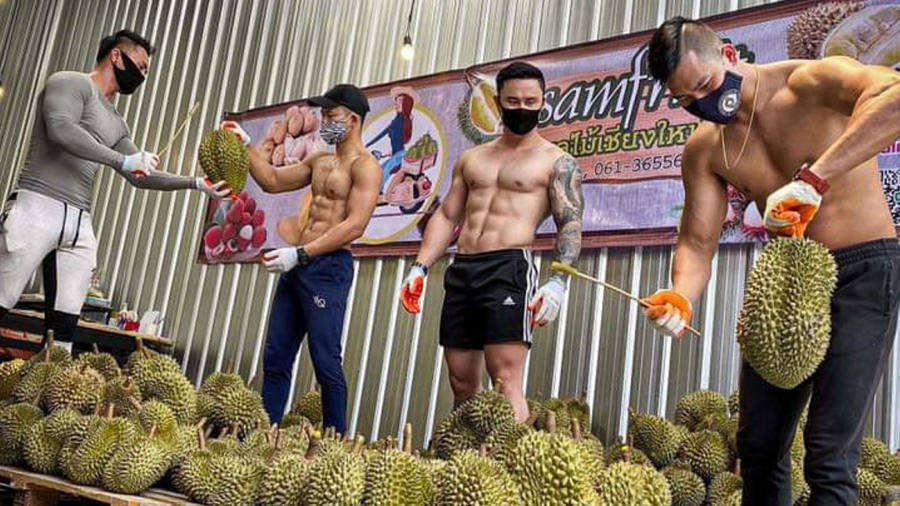
Eddy Nattapong Panastien, who works in logistics and lives in Thailand’s northern city of Chiang Mai, had time on his hands because of Covid-19. So last month he launched a start-up, Bsamfruit Durian Delivery, which is devoted to south-east Asia’s trademark spiny, fleshy tropical fruit.
Mr Nattapong’s two partners are his brother, a gym owner, and a friend who has a restaurant. Both of their businesses were ordered to be closed under Thailand’s anti-coronavirus lockdown.
“It was too boring for us to stay at home and do nothing,” Mr Nattapong said over a video call as several shirtless men packed and carted fruit in the background. “We asked: ‘What can we do?’ Durian was the answer.”
It is Thailand’s hot season, with temperatures in the high 30s, and the air is pungent with the aroma of ripening mango, rambutan, mangosteen and durian — the delicacy nicknamed the King of Fruits.
Thailand’s legion durian lovers need no prompting to buy. But the unique selling point of Mr Nattapong’s business is that its employees are buff bodybuilders — mostly men, with a few women. This beefcake has given the business a viral element among Thais who surf the web as they endure the country’s gradually easing lockdown. Bsamfruit’s Facebook page has more than 4,000 followers who go to it to watch men with washboard abs pack durians, inquire about prices and delivery, or leave lustful comments.
Mr Nattapong’s pop-up business shows how Thais, whose livelihoods were upended by coronavirus, are seizing new opportunities as they can. It also attests to the resilience of demand for durian, a product seemingly impervious to the pandemic and the country’s worst recession since the 1997 Asian financial crisis.
Thailand’s coronavirus caseload, about 3,000 confirmed infections so far, is small for a country of 69m. But the grounding of flights and the disruption of supply chains have hammered its tourism- and export-dependent economy. Yet durian is having one of its strongest-ever selling seasons, according to growers in Thailand, the world’s biggest durian producer, and in China, its biggest market. “I think durian is the only fruit that Covid-19 cannot do anything to,” said Thiraphat Aunchai, president of the Thailand Durian Growers’ Confederation. Prices for the fruit are set to rise about 15 per cent this year thanks to Chinese wholesalers, he said, and growers have shipped more than 100,000 tonnes to China.
People rarely tell you they are indifferent to durian. The fruit’s creamy, fatty golden lobes have an overpowering scent. South-east Asia is replete with stern signs warning of fines for carrying the fruit on to planes, public transport or into hotel rooms. It also has a flavour everyone struggles to describe, from caramel or custard to chopped onions or sewage — or any combination of the above.
Whether ladled over a sticky rice dessert, used to fill chocolates, or eaten on its own, it is an acquired taste with an addictive quality similar to that among fans of hot chillies.
Chinese diners have especially taken to durian in recent years, causing a rise in prices and a run in demand among south-east Asian growers. In Vietnam’s central highlands, some coffee farmers have uprooted their plants to make way for durian to meet the buoyant demand.
In the 2018 season, customers of Alibaba, the Chinese ecommerce titan, snapped up a record 80,000 premium Thai Monthong durians in just one minute. In March and April, when China was exiting lockdown and Thailand entering it, the e-tailer’s Freshippo grocery chain registered a threefold year-on-year increase in sales. “Demand for durians by Chinese customers has been strong,” the company said. Durians are normally shipped to China by land, but because of the pandemic all are being sent by sea, doubling the time it takes to reach market to 15 days, Alibaba said.
Mr Nattapong, the Chiang Mai merchant, is now thinking of opening a branch in Bangkok. He says a group of businessmen are interested in buying his brand. He is also thinking of broadening the business into a distribution centre for fruits from other parts of Thailand, once the current durian season is past. “It’s just once a year that people can try durian,” he said. “No matter how much money people have to pay, they want to try it.”
"fruit" - Google News
May 11, 2020 at 06:10PM
https://ift.tt/3fHC3K6
Stinky Asian fruit makes for sexy business as Covid lockdown eases - Financial Times
"fruit" - Google News
https://ift.tt/2pWUrc9
https://ift.tt/3aVawBg
Bagikan Berita Ini














0 Response to "Stinky Asian fruit makes for sexy business as Covid lockdown eases - Financial Times"
Post a Comment